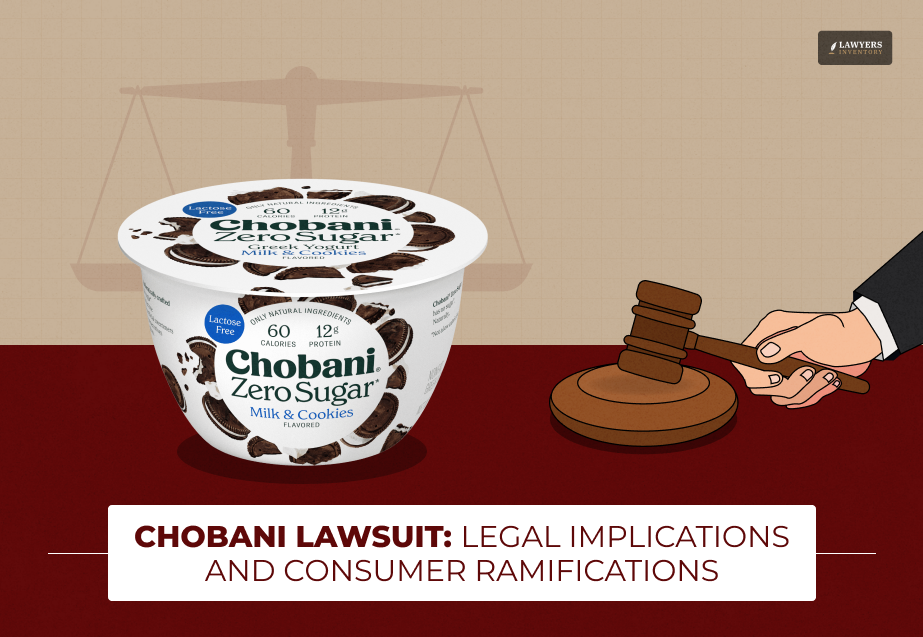
The Chobani Lawsuit concerns the Chobani entered the spotlight as a brand that embodied simplicity and health. It quickly took over the Greek yogurt market. Success breeds close attention.
This very concept came in the form of several Chobani lawsuits charging false advertising and mislabeling of products, says ClassAction.org. These well-publicized suits have been at the forefront of food transparency concerns.
Overview Of The Chobani Lawsuit
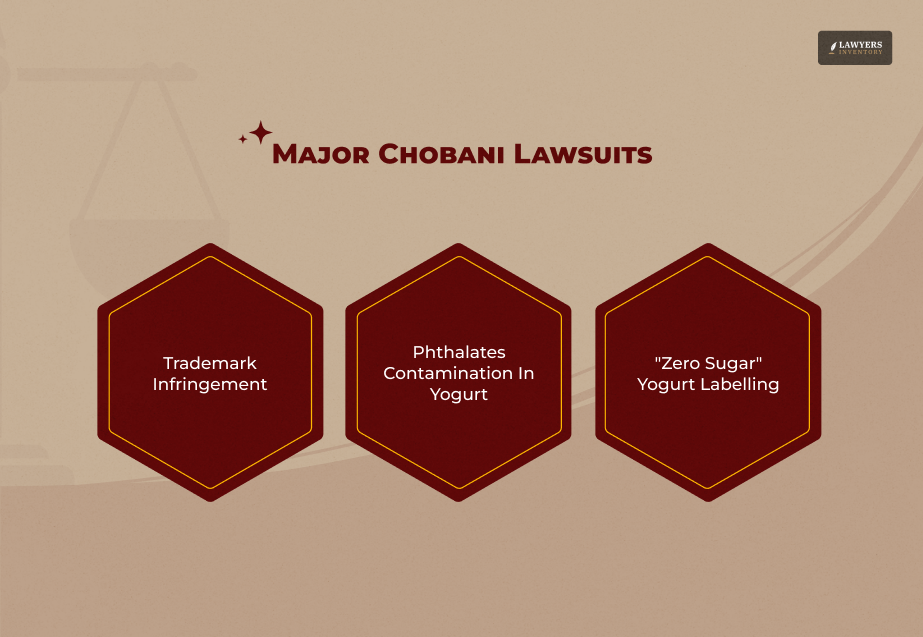
Chobani is one of the top yogurt brands, which has been engaged in several instances of false advertising and misrepresentation of products. There were arguments on “zero sugar” labels to serious claims of ingredient contamination.
However, the core of every Chobani lawsuit is whether the company’s labels accurately say what is in the product. These suits establish the threshold for just how much a company can say on its label.
These lawsuits are important for consumers and industry stakeholders to know about. To consumers, the outcome of the cases directly affects their health decisions and their trust in the brand. To industry, the rulings are setting precedents for labeling.
Thus, each Chobani lawsuit is a lesson in regulatory compliance and consumer expectations.
Zero Sugar Labeling Controversy
Chobani’s launch of “Zero Sugar” yogurt was met with a consumer lawsuit within weeks of its release. This Chobani lawsuit targeted a specific ingredient.
The Lawsuit
Consumers asserted Chobani’s “Zero Sugar” yogurt was deceptively labeled. The Chobani Zero Sugar label stated the yogurt contained no sugar but included allulose.
Allulose is a natural alternative to sugar. Plaintiffs in the Chobani class action case contended that since allulose meets the chemical definition of sugar, the “Zero Sugar” assertion is deceptive and misleading.
Legal Result
A federal judge eventually dismissed this lawsuit against Chobani. The court ruled in favor of Chobani on the basis of the FDA food labeling policy. The court stated that the FDA specifically permits allulose to be left out of the “Total Sugars” and “Added Sugars” tally on the nutrition label since it is differently metabolized compared to regular sugar.
Thus, the court ruled that the Chobani Zero Sugar label was compliant with federal law.
Implications
This ruling shows the complexity of food labeling regulations and consumer attitudes. Consumers cared about the word “sugar,” while the court cared about federal compliance.
Thus, the dismissal was a massive victory for food manufacturers that add allulose and other new sweeteners to their products. It reconfirmed the primacy of FDA guidance, which shields companies from identical claims at the state level.
‘Only Natural Ingredients’ Claim Under Spotlight
The quest for “clean labels” also gave rise to another significant Chobani lawsuit challenging the word “natural.”
The Allegation
A second Chobani class action lawsuit took issue with the company’s “Only Natural Ingredients” assertion. This competing Chobani lawsuit pointed out that the ingredients list stevia leaf extract and monk fruit extract.
The contention was that those extracts undergo intense, multi-step chemical processing, so they’re anything but the raw, “natural” ingredients a consumer would assume, according to Bloomberg Law.
This directly contradicts the Chobani natural ingredients designation on the container.
Court’s Decision
Unlike the “Zero Sugar” case, the court allowed the Chobani lawsuit regarding natural ingredients to proceed. According to the judge’s order, the presence of such highly processed extracts might not be in line with what consumers thought to be “natural.”
The order states that literal statutory compliance is sometimes not enough to avoid a suit if a claim is still deceptive to a reasonable consumer.
Consumer Impact
This case reveals the evolving criteria for Natural claims and how they are perceived by the consumer. The legal limelight now compels organizations to be more careful when using terms such as “natural” so that advertising is accurately correct. This Chobani suit shows that consumer perception can be a big factor in lawsuits.
Phthalates Contamination Lawsuit
The most significant and health-wise legal issue is the Chobani phthalates lawsuit.
The Claim
A complaint was made that Chobani yogurts, despite the Chobani natural ingredients claim, were discovered to include phthalates. Phthalates are a class of industrial chemicals with the primary function of softening plastics.
According to Top Class Actions, the Chobani phthalate complaint alleges that the chemicals most likely seeped into the yogurts from the plastic cups themselves.
Legal Proceedings
The Chobani phthalates lawsuit is ongoing and represents a major legal risk for the company. Here, the plaintiffs are seeking monetary damages and class status for all of the consumers who purchased the tainted products.
They are calling for the company to change its packaging and sourcing practices.
Health Concerns
These are known as Endocrine-disrupting chemicals in food. They have been linked to so many diseases: hormonal imbalance, reproductive harm, and developmental problems, among many others.
All those claims in the lawsuit challenge the safety of the product and, thus, the public’s perception of Chobani as healthy. More concerning than that was the food labeling lawsuits some time ago about sugar or vanilla.
Lawsuits are not just about ingredients but about market competition as well.
The Dispute
Danone, the corporate parent of competing brands like Dannon, filed a Chobani lawsuit for trademark infringement. This Chobani trademark lawsuit was over the packaging and name of Chobani’s ready-to-drink cold brew coffee line of products.
So, through it, Danone complained looked too much like one of its coffee brands.
Chobani’s Defense
In defending the Chobani trademark fight, the company likely argued that the words and designs in question were generic or descriptive terms. They claimed the terms are generic in the coffee sector and, therefore, not entitled to exclusive trademark protection.
Industry Implications
This case is a mirror of the competitive pressure and legal jousting that quite frequently occur in the food and beverage sector, particularly for new product categories such as cold brew coffee. The lawsuit indicates the extent to which competitors are willing to go to maintain their market share and brand identity.
Read Also: Chicken Class Action Lawsuit- How To Claim Your Share Of $203.5 Million
Regulatory Oversight And Compliance
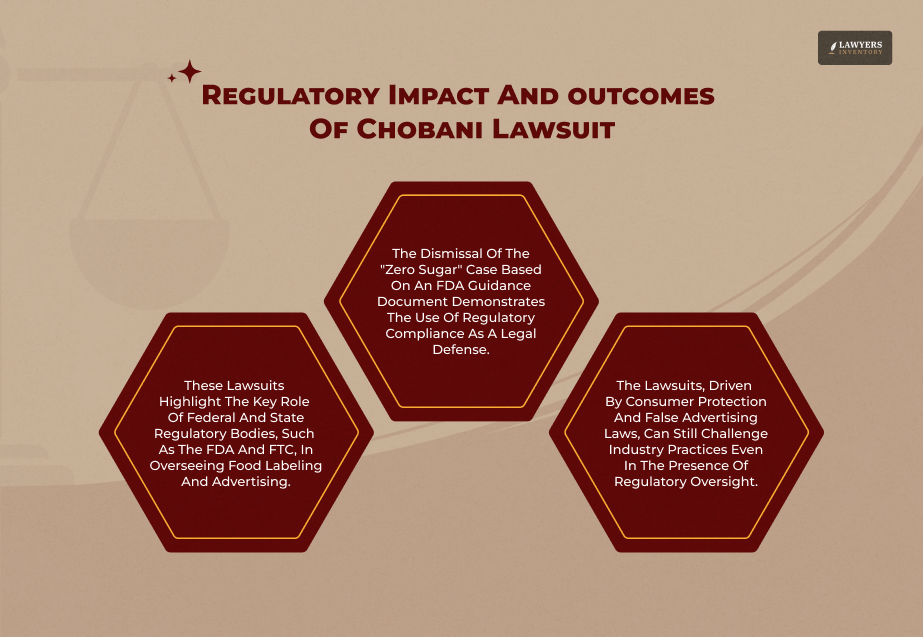
All these Chobani lawsuits have been shaped by the dense legal and regulatory landscape.
FDA’s Role
FDA guidance is also a primary component of food labeling litigation, serving as an industry defense when its claims are aligned with federal requirements. The “Zero Sugar” dismissal was founded directly on the FDA food labeling regulations.
It demonstrated the agency’s power to preemptively shut down state-level consumer protection laws.
State vs. Federal Jurisdiction
The cases illustrate the complex overlap between federal law and state Consumer protection laws. While the FDA protects Chobani on the technical definition of sugar, state courts will more likely consider whether a claim, like the Chobani natural ingredients claim, is misleading to consumers under general Consumer protection laws.
Consumer Protection
Lastly, these suits point to the ongoing need for clean and steady labeling to protect consumer interests. Every Chobani Yogurt lawsuit brings the industry one step closer to increased transparency.
Expert Analysis And Recommendations
The Chobani lawsuits, at a constant flow, are changing how the company and the industry conduct business.
Legal Perspectives
Legal experts say that a business can no longer simply rely on technical compliance. Its marketing claims must align with reasonable consumer expectations and the current regulatory requirements at the same time.
Litigation risk is too high.
Also, the Chobani Phthalates Lawsuit created a new wave, and businesses will now show that their packaging and all supply chain areas are free from toxic pollutants.
Read Also: Direct Fairways Lawsuit- Allegations, Legal Implications, And Consumer Impact
Frequently Asked Questions (FAQs):
Shoppers must carefully examine food labels and ignore front-of-package label statements like “natural.” Stay current with the latest court decisions and any Chobani Class Action Lawsuit. To ask if Chobani is healthy is to look beyond the hype and read the ingredient list from top to bottom.
The outcomes of the food labeling lawsuits are useful facts in making healthier, better-educated food purchasing decisions.
These lawsuits, from the technical Chobani Zero Sugar labeling lawsuit to the big Chobani phthalates lawsuit, are reflective of the high-stakes business climate for large food companies.
The constant legal pressure is ultimately compelling greater transparency and accountability throughout the overall food industry.
Ans. The first huge public outcry was the 2013 voluntary Greek yogurt cup recall due to a mold contamination issue. This was followed by a lawsuit by Chobani for consumer economic loss prior to the current wave of food labeling lawsuits.
Ans. Chobani was also sued for the use of the “Fair Trade Certified Dairy” label. A complaint against Chobani was made, stating that the company’s pledge to its fair trade with dairy farmers was misleading.
This complaint is specifically aimed at ethical sourcing and transparency in terms of its social responsibility labeling.
Ans. Chobani was sued on its vanilla yogurt for blending artificial vanillin with natural vanilla. That lawsuit against Chobani was settled and dismissed.
The terms of the settlement are not typically divulged, though this kind of suit typically is settled on an agreement to label more clearly.
Ans. Chobani’s war on trademarks held up and, at a substantial cost of law, prevented Chobani from entering ready-to-drink cold brew coffee with its acquisition of La Colombe.
Such lawsuits hold up product launches and investment, proving that competition in the marketplace also equals fighting in court.
Chobani Seeks Dismissal of Danone’s Trademark Lawsuit Over Coffee Branding – Read more at DairyNews.today.
Ans. Most Chobani yogurt lawsuits are brought under state Consumer protection laws because those statutes typically allow private individuals to sue for misleading advertising. The FDA sets technical standards, and state laws allow consumers to argue that a label.
Thus, the Chobani natural ingredients claim is misleading to a reasonable no matter if it meets the federal standards.






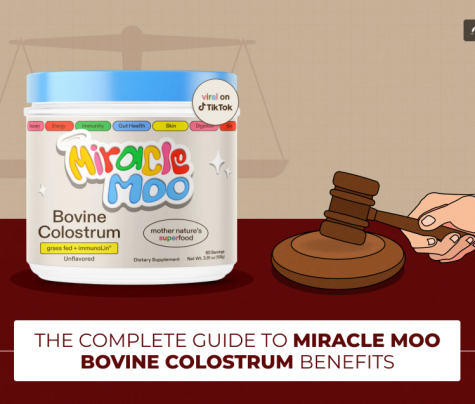
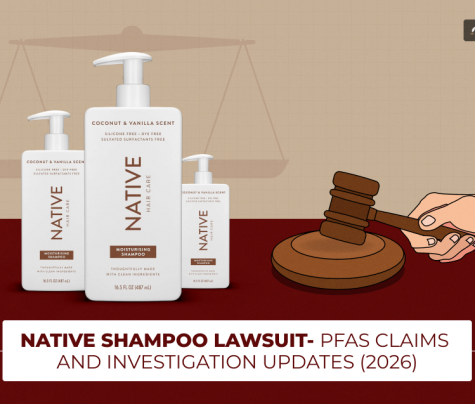




0 Reply
No comments yet.